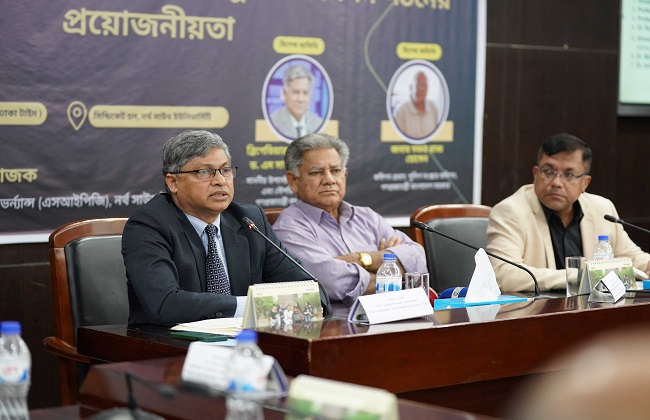
The South Asian Institute of Policy and Governance (SIPG) at North South University Saturday organized a seminar on “Proposal for the Formation of a Police Commission and Other Reforms to Ensure Pro-People Policing Services,” as part of its ongoing research initiatives addressing pressing national issues. The seminar focused on SIPG’s recent position paper, developed in response to the needs identified in the aftermath of the July Revolution. It offered a comprehensive discussion on strategies for institutional police reform.
Brig. Gen. M. Sakhawat Hussain, PhD (Retd.), Honorable Adviser to the Ministry of Shipping and Ministry of Textiles and Jute of the Government of the People’s Republic of Bangladesh, attended the event as a special guest. The panel featured academics, scholars, representatives from various political parties, and senior government officials, bringing diverse views to the conversation.
In his address, special guest Brig. Gen. M. Sakhawat Hussain, PhD (Retd.), emphasized the urgency of the proposed reforms and the potential impact of a youth-inclusive approach to policing. He further stated “After the 8th of August, I spoke with members of the Police. They expressed their desire to be under a commission; they did not want to be politicized. Therefore, I believe that the formation of a police commission is of utmost importance to change the current image of the police. I also think that police recruitment should fall under the jurisdiction of the police commission.”
Professor Sk. Tawfique M. Haque, Director of SIPG at North South University, moderated the seminar by highlighting the necessity of police reforms and the potential role of youth, particularly students, in this transformative process.
Dr. Md. Rizwanul Islam and Dr. Ishrat Zakia Sultana delivered the seminar’s keynote presentations, outlining a potential roadmap for reform and a structured framework for establishing a police commission. They emphasized the importance of community engagement in creating a truly pro-people policing service. The speakers also highlighted findings from a recent SIPG survey, which revealed a significant lack of public trust in the police, with only 11% of respondents indicating confidence in the force. The proposal further underscored the importance of students playing an active role in these reform initiatives, thereby facilitating a closer alignment between policing and community service. Dr. Rizwanul Islam also noted that, rather than utilizing a three-tier recruitment process, a two-tier recruitment system would be more effective for assessing the capabilities of young recruits.
Mr. Bobby Hajjaj, the founder and chairman of the National Democratic Movement, expressed support for the proposal to form a police commission, stating that such a move would facilitate the decentralization of power and the depoliticization of law enforcement. Additionally, Dr. Baharul Alam, retired Additional Inspector General of Bangladesh Police, remarked, “I welcome the position of revising the three-step recruitment process. I believe that this will enhance the bonding among police members.”
Mr. S. M. Jahrul Islam, a former Home Secretary of the Government of the People’s Republic of Bangladesh and an adviser to the Chairperson of the Bangladesh Nationalist Party, emphasized the need to rethink recruitment policies. He stated, “If a constable is capable, trustworthy, and intelligent, he should have the opportunity to be promoted to the highest rank throughout his professional career. Any policy that serves the betterment of the people will be gladly welcomed and accepted by the Bangladesh Nationalist Party.”
Barrister Mohammad Mosharraf Hossain, a Deputy Inspector General of Bangladesh Police, stressed the importance of addressing the current morale and psychological well-being of police personnel. He noted, “I believe that reform is not possible with policies that undermine morale.” The final panelist, Md. Mahbubul Karim, an Additional Deputy Inspector General of Bangladesh Police, argued that the reformation of the police force should not be considered in isolation as “a separate island”. He added, “We need to align all reform efforts cohesively, recognizing that the police are an integral part of our society.”
The session concluded with closing remarks from Prof. Abdul Hannan Chowdhury, Vice-Chancellor of North South University, who reiterated the university’s commitment to fostering research and dialogue on matters of national importance. He stated, “As a citizen of this country, I firmly believe that no nation can achieve true development unless its people embrace civility and responsibility. Furthermore, members of the police force must uphold the highest standards of ethical and moral integrity. They should demonstrate genuine empathy towards the citizens they serve, recognizing that their role is fundamentally about supporting and protecting the people of this nation.”
